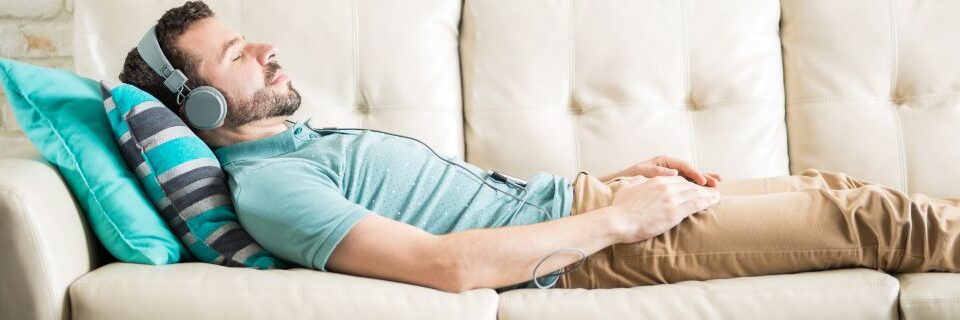
Manage Pandemic Fatigue with a Self-Hypnosis App

Relaxation Hypnosis for Pregnancy
Table of Contents
Have you ever been so tired that sleep was elusive? For some people, day-to-day stress can lead to an inability to relax and hyperarousal. Hyperarousal is a state in which the body and brain are overly excited and prepared for danger. When you are in a state of hyperarousal, you might struggle not just with insomnia but with persistent feelings of stress and anxiety during the daytime as well. UpNow’s self-hypnosis download for relaxation and deep sleep can help you feel calmer so that you can get the rest you need.
The Role of Stress in Modern Lives
The fight-or-flight response developed to keep us safe from harm. This powerful response gave us an edge when it came to running away from predators or fighting for our lives. Today, though, it has a different effect. We rarely find ourselves face-to-face with apex predators. Most of our stress comes in the form of deadlines, traffic, and everyday irritations.
What if we could melt that stress away through a self-hypnosis download for relaxation?
The human body has not caught up with the altered stress load. That constant low-level stress keeps our bodies prepared for a fight. Studies from around the world show the toll this is taking on us. In Japan, Sweden, and South Korea, researchers found that workers in high-stress environments were more likely to suffer from insomnia. U.S. college students dealing with family stress were also likely to suffer from sleep loss. Our self-hypnosis audio download offers tools that empower you to take control of your stress.
Stress and hyperarousal can affect your whole body, from the brain and nervous system to the immune system and endocrine system. Unfortunately, once it starts causing a lack of sleep, it can become a cyclical problem that can be tough to defeat. You are more likely to become hungry and put on weight.
Our self-hypnosis audio download can help you take control, calm your stress response, and get the deep, restful sleep your body needs to heal. Weight loss hypnosis can also help you shed the extra pounds you put on during periods of intense stress.
Self Hypnosis for Deep Relaxation
Hypnotherapy has been studied extensively for everything from anxiety and depression to surgery preparation and recovery. Several clinical trials have been conducted using hypnosis to help surgical patients relax. These studies revealed that hypnosis could help promote physical recovery, shorten postoperative stays and boost the psychological response after surgery.
Outside the surgical suite, self-hypnosis for deep relaxation can be just as beneficial. It can help you relax and get the sleep your body has been craving.
According to one study, hypnosis can help you fall asleep faster and spend more time in deep restful sleep. Swiss researchers evaluated women between 18 and 35. During the five-week study, the women were connected to equipment to measure their sleep patterns and brain activity. One group listened to hypnosis audios while the other group listened to neutral recordings. Women who were more susceptible to hypnosis and who used hypnosis audios slept about 67 percent longer and enjoyed significantly deeper sleep than those who did not use hypnosis audios.
If you are struggling to calm your anxiety, quiet your stress, and get the rest you need, then you might benefit from UpNow’s self-hypnosis download for relaxation. Visit UpNow.com today to learn more about our self-hypnosis download for relaxation and deep sleep or subscribe to our newsletter for the latest updates and offers.
UpNow Health only uses high-quality sources, including peer-reviewed articles, to support the facts within our articles. All our articles are reviewed by experts to ensure that our content is accurate, helpful, and trustworthy.
1. Basta, M., Chrousos, G. P., Vela-Bueno, A., & Vgontzas, A. N. (2007). CHRONIC INSOMNIA AND STRESS SYSTEM. Sleep medicine clinics, 2(2), 279–291. https://doi.org/10.1016/j.jsmc.2007.04.002
2. Linton S. J. (2004). Does work stress predict insomnia? A prospective study. British journal of health psychology, 9(Pt 2), 127–136. https://doi.org/10.1348/135910704773891005
3. Megumi Utsugi, MPH, Yasuaki Saijo, MD, Eiji Yoshioka, MD, Naoko Horikawa, MA, Tetsuro Sato, MS, Yingyan Gong, MD, PhD, Reiko Kishi, MD, MPH, PhD, Relationships of Occupational Stress to Insomnia and Short Sleep in Japanese Workers, Sleep, Volume 28, Issue 6, June 2005, Pages 728–735, https://doi.org/10.1093/sleep/28.6.728
4. Hwan-Cheol Kim, Byeong-Kwon Kim, Kyoung-Bok Min, Jin-Young Min, Sang-Hee Hwang, Shin-Goo Park. Association Between Job Stress and Insomnia in Korean Workers. Journal of Occupational Health. https://www.jstage.jst.go.jp/article/joh/advpub/0/advpub_10-0032-OA/_article/-char/ja/
5. Bernert, R. A., Merrill, K. A., Braithwaite, S. R., Van Orden, K. A., & Joiner, T. E., Jr (2007). Family life stress and insomnia symptoms in a prospective evaluation of young adults. Journal of family psychology : JFP : journal of the Division of Family Psychology of the American Psychological Association (Division 43), 21(1), 58–66. https://doi.org/10.1037/0893-3200.21.1.58
6. Glaze D. G. (2004). Childhood insomnia: why Chris can’t sleep. Pediatric clinics of North America, 51(1), 33–vi. https://doi.org/10.1016/s0031-3955(03)00176-7
7. Kalmbach, D. A., Cuamatzi-Castelan, A. S., Tonnu, C. V., Tran, K. M., Anderson, J. R., Roth, T., & Drake, C. L. (2018). Hyperarousal and sleep reactivity in insomnia: current insights. Nature and science of sleep, 10, 193–201. https://doi.org/10.2147/NSS.S138823
8. Robert P. Blankfield M.D. (1991) Suggestion, Relaxation, and Hypnosis as Adjuncts in the Care of Surgery Patients: A Review of the Literature, American Journal of Clinical Hypnosis, 33:3, 172-186, DOI: 10.1080/00029157.1991.10402927
9. Cordi, M. J., Schlarb, A. A., & Rasch, B. (2014). Deepening sleep by hypnotic suggestion. Sleep, 37(6), 1143–1152F. https://doi.org/10.5665/sleep.3778










